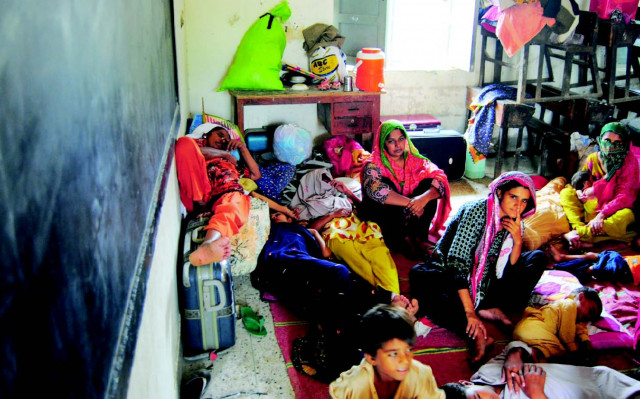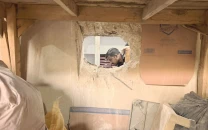Hundreds of tales, countless woes
A relief camp set up by the Sindh Taraqi Pasand Party is home to more than 300 flood survivors.

“What do I tell you about the losses I suffered in the floods? You can write that nothing is safe and all our valuables have been washed away,” said Allah Dino Meerani, a flood survivor who came to Karachi with nothing but his family of five and is living at the camp.
The school’s hall was packed with people who hailed from different parts of Sindh, including Kandhkot, Thul, Ghauspur and Khanpur. Most of the survivors were sitting on the ground, as toddlers crawled their way through the crowd and mothers tried to keep up with them.
According to the women, most children at the camp are suffering from gastroenteritis. A lack of clean drinking water and proper medical care has made them worry that the situation may become much worse.
Among the people who tried to push their way through the throng, eager to recount the tale of their plight to any visitor they chanced upon, was 40-year-old Hajan Khoso, who hailed from Sheeralabad, Kandhkot. He said the floods had taken him and his family completely by surprise, because of which he had lost everything to the torrents.
“My house collapsed. All my cattle, including two cows and one buffalo, were swept away,” said Khoso, as he relived his escape.
The floods approached his village on Monday night when the villagers were asleep. “There was no light in our village as the roaring waters drew near. I told my wife to take the children as I took the holy Quran and we made our way to the main road. We had no time, not even to grab our slippers. I am just grateful that God saved us,” Khoso said.
According to Khoso, people from his village were unprepared because they had been told that nothing will happen.
“We were confused. Some people warned us about the floods a few days ago. But others said nothing will happen so we did nothing to prepare for the floods. Otherwise we would have at least saved our valuables,” he said.
Manzoor Ahmed, who hails from Kashmore, has seven children and is on his way to fathering yet another. However, his wife is eight months into pregnancy and he is worried that the 12-hour journey from Kashmore to Karachi may have taken its toll on her condition. Ahmed has been looking for a lady doctor who can examine his wife and make sure things are okay.
He said that his family, along with 100 other people from the village, had made its way to Daharki first. There they found a trawler which brought them to Karachi.
“It cost us around Rs40,000 to make the journey. Some people had to sell all their cattle and gold,” said Ahmed, adding that around 600 villages in their district had been inundated with water.
“Our crops have been destroyed in the water, which is at least eight to 10 feet deep. The government must provide us with shelter. We cannot live in this school hall forever,” he said. The conditions at another camp, set up in a school in Bhittaiabad, near the airport, were no better as classrooms and corridors swarmed with flood survivors.
“We have requested the management to keep the school closed for two to three days so that we can make some alternate arrangements for the people,” said Ali Raza Ghumro, a social worker in the area. Despite appealing to the local political leadership for help, Ghumro said that they had yet to receive any kind of support.
Campers complained that the elected officials had been missing in the relief and rehabilitation process since the very beginning, going so far as to calling the floods a “conspiracy”.
“This flood is man-made. The government deliberately broke the Tori embankment,” said Manzoor Soomar, a primary teacher who hails from Khanpur. He claimed that the floods were deliberately allowed to inflict this kind of damage as it was part of a plan, executed by the government to beg for millions of dollars in the shape of aid from the international community.
Soomar said that his village was completely submerged underwater, adding that not a single village in his tehsil had remained safe from the torrents.
“A breach near Ali Wahan would have saved thousands of people. But parliamentarians, who owned sugar mills and land in the area, did not let government break the embankment,” he said.
Soomar came to Karachi after paying four times the amount it would normally take him to get here. He said that more vehicles were headed towards Karachi, because it is the only city in Sindh which is safe from floods. “However, there are a lot of people in the camp I am living in. So I am going to search for another place for my family to live in,” Soomar concluded.
Published in The Express Tribune, August 14th, 2010.



















COMMENTS
Comments are moderated and generally will be posted if they are on-topic and not abusive.
For more information, please see our Comments FAQ